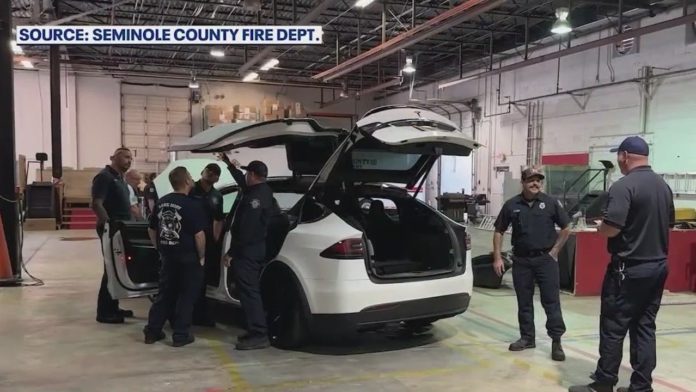Firefighters train for electric vehicle fires
Electric vehicle fires and ways to address them are part of the special training firefighters are now receiving, particularly in Seminole County.
SANFORD, Fla. – Electric vehicle fires and ways to address them are part of the special training firefighters are now receiving, particularly in Seminole County.
“The lithium-ion battery car fires are a bit different than a regular gasoline car fire, in the fact that there is the lithium available, so it burns and won’t be put out by water. So it burns hotter, faster, and is more difficult to extinguish than a normal car fire,” explained Asst. Chief Tod Zellers.
Zellers said that water doesn’t help fight this kind of fire.
“Unless we can get it put out immediately if the battery itself is burning, we’re going to let that battery burn until it extinguishes itself. That’s mainly due to concerns about the battery re-igniting.”
Re-ignition can happen up to a month after the initial fire has gone out. Zellers said those electric vehicles must be towed to a special quarantine area for 30 days, just in case that happens.
“All the firemen and paramedics are getting trained in emergency vehicle response and lithium-ion response. We have a special operations team that will respond to every lithium-ion fire as well.”
Along with the potential fire risks from electric vehicles, fire officials said people should also consider the risks posed by smaller lithium-ion batteries in their devices, like laptops. They said there were telltale signs that those batteries were in danger of exploding or catching fire.
“This is typically on the front by the keyboard,” Zellers said, pointing to the bloated battery pack. “When that starts to swell, you’re going to notice your keyboard start to pop up and swell, as well.”
Zellers said the smoke from a lithium-ion battery fire could also be very dangerous. “So if you see that white smoke coming from a lithium fire, that’s very toxic. Don’t get into that smoke at all.”
Zellers said the best thing to do if there was a lithium-ion battery fire is to get away from the area. When you call 911, let them know it’s a lithium-ion battery or electric vehicle fire so they can handle it properly.

